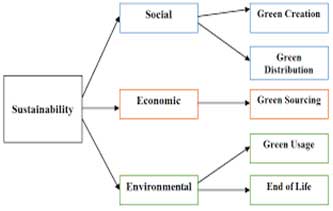Date. 7th June 2023
Sustainable business, or green business, is an enterprise that has minimal negative impact on the global or local environment, community, society, or economy, a business that strives to meet the three basic principles, People, Planet and Profit. Often, sustainable businesses have progressive environmental and human rights policies. it is also known as Green Business that consisted of the following four basic criteria.
Business sustainability, also known as corporate sustainability, is the management and coordination of Environmental, Social and Financial demands and concerns to ensure responsible, Ethical and ongoing success. In a broader context, social, environmental and economic demands are considered the three pillars of sustainability. Within the corporate world, they are sometimes referred to as the triple bottom line principles. The concept is a departure from the traditional concept of which evaluates all efforts in terms of their short-term measures that effect on the profits. In traditional Corporate Cultures, Social and Environmental concerns have typically been considered to conflict with financial goals.
Depletion of non-renewable resources, for example, is obviously not a sustainable practice. However, because alternatives typically require investments in Infrastructure, continuing to rely upon fossil fuels which is the least expensive short-term option. The goal of sustainability requires a more extended timeline for long term return on investment but once initial investments are made, they can actually lead to increased profitability. One example is free cooling for data centers, which takes advantage of naturally occurring phenomena to control temperatures. Although the technologies involved may require initial cash outlay, the renewable resources they rely upon are freely available and reliable, which will eventually pay off. Similarly, investments in socially ethical practices may initially cost a business money but typically lead to enhanced recruitment, branding and public relations, which all tend to lead to increased profitability.
Reduced Costs
Sustainable business practices can help companies save money in several ways. For example, implementing energy-efficiency measures can reduce a company's energy bills. Energy efficiency is especially effective for businesses that use a large amount of electricity, such as manufacturers and retailers.
Increased profits
Sustainable businesses enjoy increased profits because they operate more efficiently and have lower overhead costs. According to a review of 56 academic papers by Deutsche Bank, firms with high ESG ratings have lower debt, and equity costs and nearly 90% of the studies examined found that firms with high ESG ratings outperform the market in the medium, three to five years and long as five to ten years terms.
Improved public image
As known before, consumers are increasingly interested in sustainable products and services. Implementing sustainable business practices can help a company improve its public image, leading to increased sales, profits, and market share. In addition, sustainability can help a company improve its reputation with stakeholders in the community and government officials because it shows them that the business is concerned about environmental protection, social justice and good governance. Bloomberg Intelligence predicts ESG assets to hit $53 trillion by 2025, a third of the global assets under management.
Greater employee satisfaction
Employees at sustainable businesses tend to be happier and more engaged in their work, which leads to a more productive workforce and lowers employee turnover rates. Sustainable businesses tend to provide a healthier work environment with good ventilation, natural lighting, and ergonomic furniture. These things can help reduce stress and improve employee morale. Additionally, sustainable business practices are associated with the ethical treatment of workers. For example, the company might support worker unions or offer fair wages and benefits to all employees regardless of their position in the company.
Enhanced social responsibility
Sustainable businesses are more likely to be socially responsible, which is vital for many reasons. For example, it makes the company more attractive to consumers who want to support businesses that are helping improve social conditions in their communities. It's also a good way for businesses to build goodwill and strengthen their ties with the communities in which they operate.

Finally, in general businesses concerned about their impact in the world around them often make better decisions, leading to a stronger bottom line approach. Implementing sustainable business practices can help a company save money, increase profit’s ability, become more socially,economically envoirmentally responsible and obtained equitable market share which is essential for its sustainability.

PGDCM PGDSM PGCPM MQSI SACD
Construction- Quantity Surveyor- Valuer/ Appraiser. Project Management
37 PattensenTurkeyen, Dennis Street, Georgetown, Guyana
Email. Jewelccameron55@yahoo.com